人教版九年级英语U 1 -U 3 月考阶段性复习讲解(共49张PPT)
文档属性
| 名称 | 人教版九年级英语U 1 -U 3 月考阶段性复习讲解(共49张PPT) |
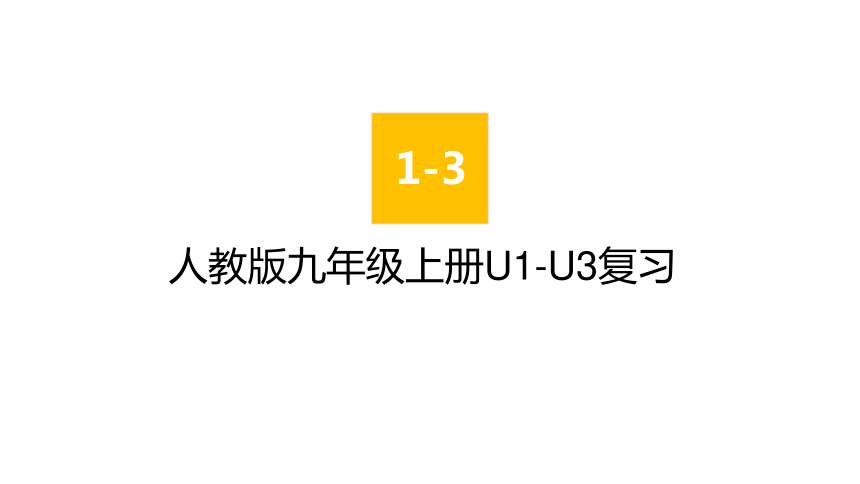
|
|
| 格式 | pptx | ||
| 文件大小 | 963.4KB | ||
| 资源类型 | 教案 | ||
| 版本资源 | 人教新目标(Go for it)版 | ||
| 科目 | 英语 | ||
| 更新时间 | 2024-01-01 17:29:18 | ||
图片预览

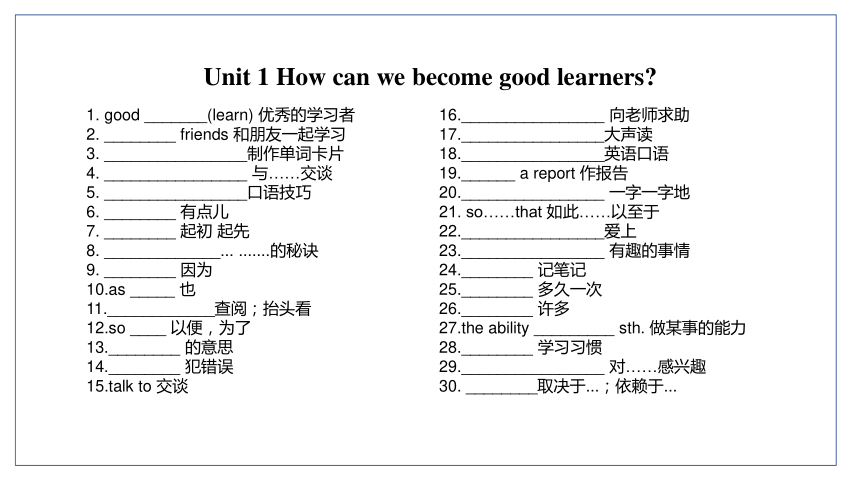
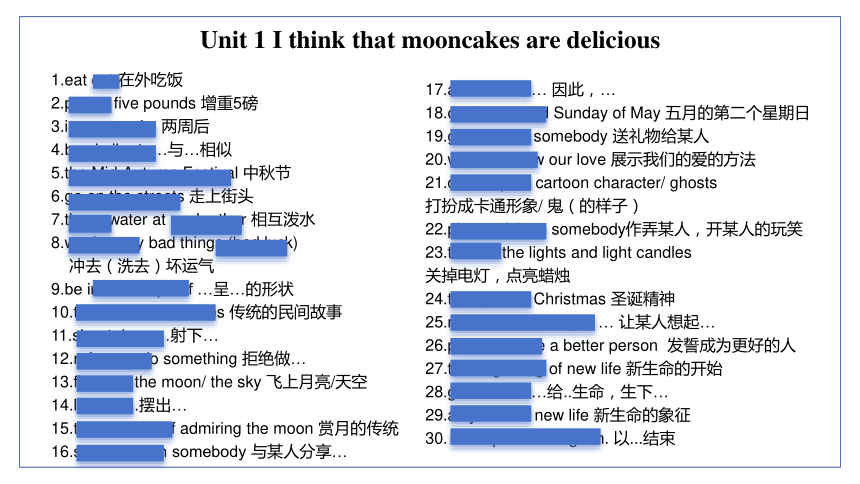
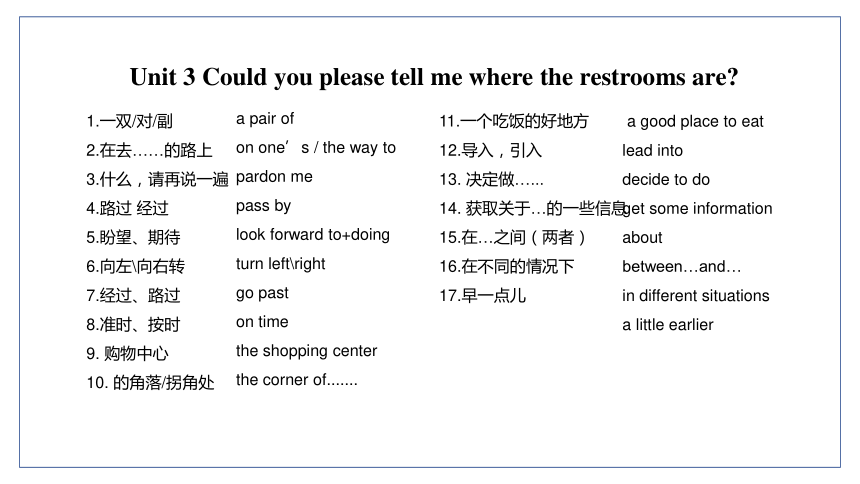

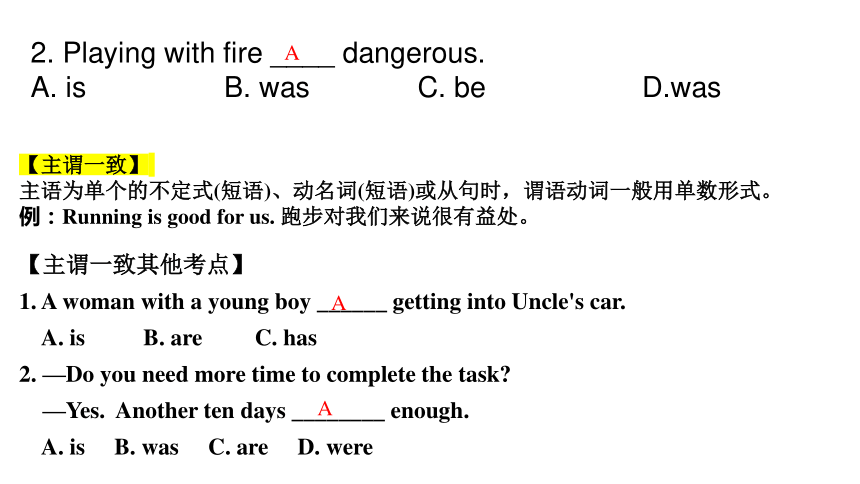
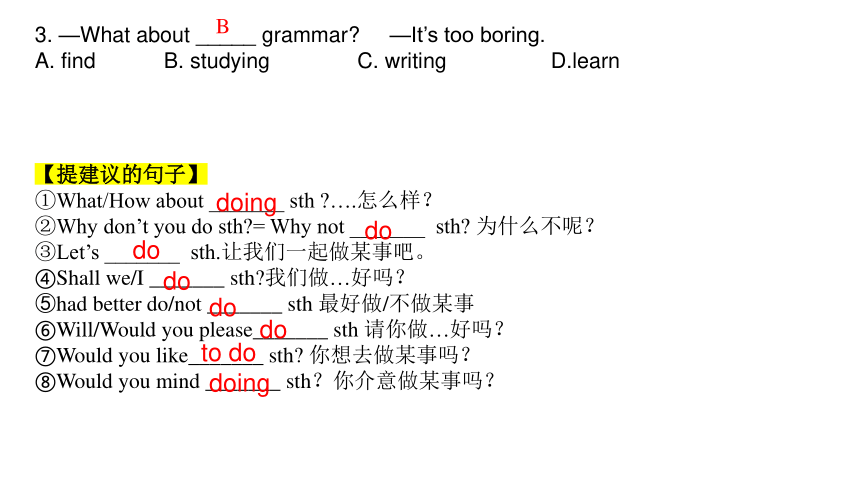
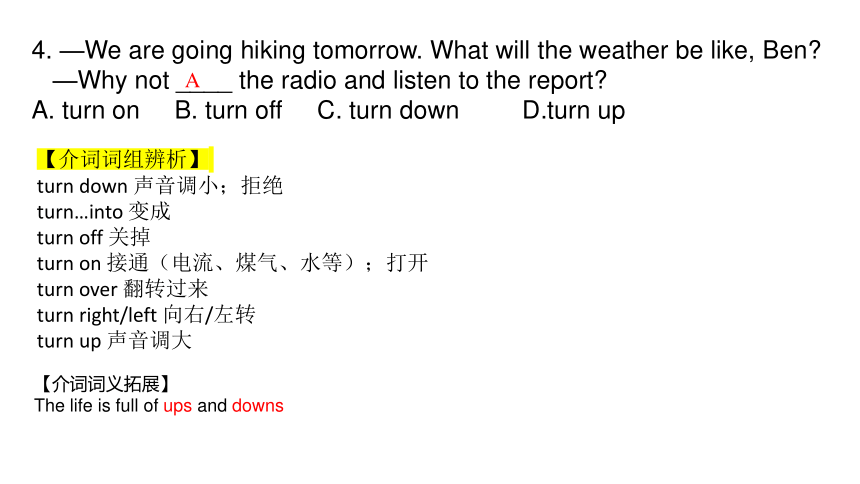
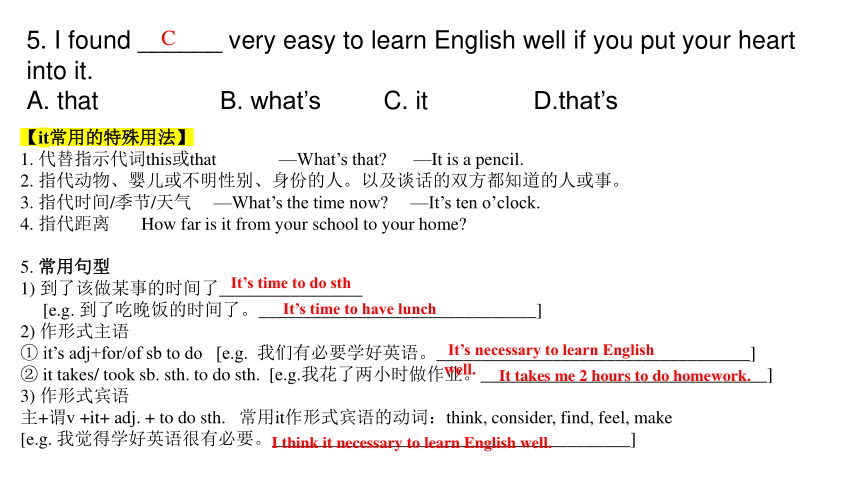
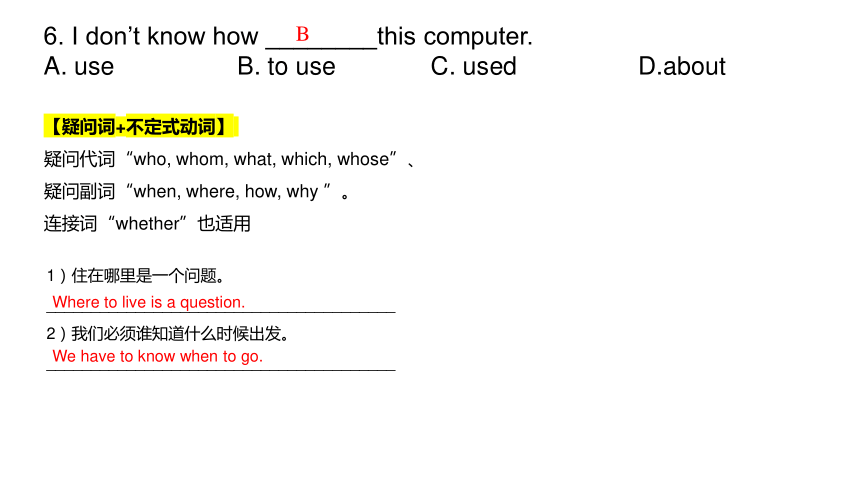

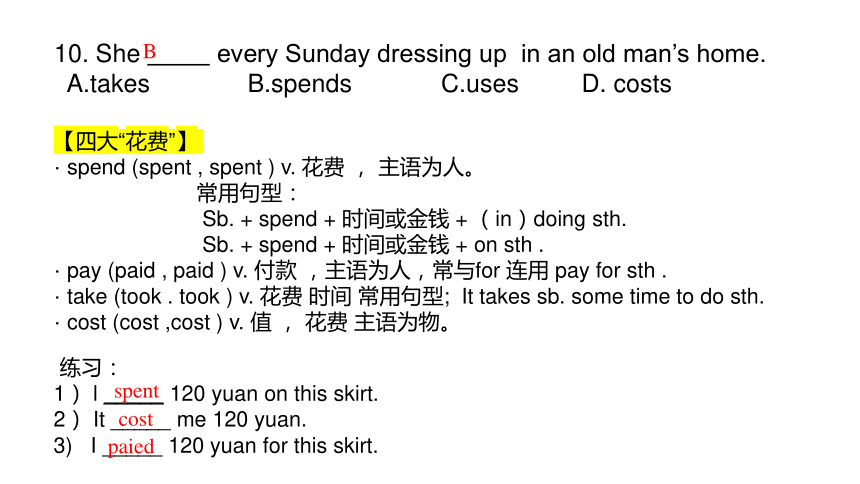
文档简介
(共49张PPT)
综合测试
1-3
人教版九年级上册U1-U3复习
Unit 1 How can we become good learners
Unit 1 How can we become good learners
1. good _______(learn) 优秀的学习者
2. ________ friends 和朋友一起学习
3. ________________制作单词卡片
4. ________________ 与……交谈
5. ________________口语技巧
6. ________ 有点儿
7. ________ 起初 起先
8. _____________... .......的秘诀
9. ________ 因为
10.as _____ 也
11.____________查阅;抬头看
12.so ____ 以便,为了
13.________ 的意思
14.________ 犯错误
15.talk to 交谈
16.________________ 向老师求助
17.________________大声读
18.________________英语口语
19.______ a report 作报告
20.________________ 一字一字地
21. so……that 如此……以至于
22.________________爱上
23.________________ 有趣的事情
24.________ 记笔记
25.________ 多久一次
26.________ 许多
27.the ability _________ sth. 做某事的能力
28.________ 学习习惯
29.________________ 对……感兴趣
30. ________取决于...;依赖于...
Unit 1 How can we become good learners
Unit 1 I think that mooncakes are delicious
1.eat out 在外吃饭
2.put on five pounds 增重5磅
3.in two weeks 两周后
4.be similar to…与…相似
5.the Mid-Autumn Festival 中秋节
6.go on the streets 走上街头
7.throw water at each other 相互泼水
8.wash away bad things (bad luck)
冲去(洗去)坏运气
9.be in the shape of …呈…的形状
10.traditional folk stories 传统的民间故事
11.shoot down…射下…
12.refuse to do something 拒绝做…
13.fly up to the moon/ the sky 飞上月亮/天空
14.lay out ...摆出…
15.the tradition of admiring the moon 赏月的传统
16.share … with somebody 与某人分享…
17.as a result, … 因此,…
18.on the second Sunday of May 五月的第二个星期日
19.give gifts to somebody 送礼物给某人
20.ways to show our love 展示我们的爱的方法
21.dress up as cartoon character/ ghosts
打扮成卡通形象/ 鬼(的样子)
22.play a trick on somebody作弄某人,开某人的玩笑
23.turn off the lights and light candles
关掉电灯,点亮蜡烛
24.the Spirit of Christmas 圣诞精神
25.remind somebody of … 让某人想起…
26.promise to be a better person 发誓成为更好的人
27.the beginning of new life 新生命的开始
28.give birth to…给..生命,生下…
29.a symbol of new life 新生命的象征
30. end up with/doing sth. 以...结束
Unit 1 How can we become good learners
Unit 3 Could you please tell me where the restrooms are
1.一双/对/副
2.在去……的路上
3.什么,请再说一遍
4.路过 经过
5.盼望、期待
6.向左\向右转
7.经过、路过
8.准时、按时
9. 购物中心
10. 的角落/拐角处
11.一个吃饭的好地方
12.导入,引入
13. 决定做…...
14. 获取关于…的一些信息
15.在…之间(两者)
16.在不同的情况下
17.早一点儿
a pair of
on one’s / the way to
pardon me
pass by
look forward to+doing
turn left\right
go past
on time
the shopping center
the corner of.......
a good place to eat
lead into
decide to do
get some information about
between…and…
in different situations
a little earlier
1. by + doing 表示“_______________,”
by 还可以表示:by+交通工具(交通工具前不能加限定词) “by bus, by train”
by后面加人,可以表示“被;由”的意思 “was eaten by me”
【by短语】
_______________顺便问一下
_______________偶然地
_______________错误地
_______________一个接一个
_______________一步一步地
_______________用手
[
通过...的方式
1. —How do you study for an English test —______
A. By work with friends. B.For asking the teacher with help.
C. By making vocabulary lists. D.For listening to the tape
C
by the way
by accident
by mistake
one by one
step by step
by hand
2. Playing with fire ____ dangerous.
A. is B. was C. be D.was
A
【主谓一致】
主语为单个的不定式(短语)、动名词(短语)或从句时,谓语动词一般用单数形式。
例:Running is good for us. 跑步对我们来说很有益处。
【主谓一致其他考点】
1. A woman with a young boy ______ getting into Uncle's car.
A. is B. are C. has
2. —Do you need more time to complete the task
—Yes. Another ten days ________ enough.
A. is B. was C. are D. were
A
A
【提建议的句子】
①What/How about _______ sth ….怎么样?
②Why don’t you do sth = Why not _______ sth 为什么不呢?
③Let’s _______ sth.让我们一起做某事吧。
④Shall we/I _______ sth 我们做…好吗?
⑤had better do/not _______ sth 最好做/不做某事
⑥Will/Would you please_______ sth 请你做…好吗?
⑦Would you like_______ sth 你想去做某事吗?
⑧Would you mind _______ sth?你介意做某事吗?
[
3. —What about _____ grammar —It’s too boring.
A. find B. studying C. writing D.learn
B
doing
do
do
do
do
do
to do
doing
4. —We are going hiking tomorrow. What will the weather be like, Ben
—Why not ____ the radio and listen to the report
A. turn on B. turn off C. turn down D.turn up
A
【介词词组辨析】
turn down 声音调小;拒绝
turn…into 变成
turn off 关掉
turn on 接通(电流、煤气、水等);打开
turn over 翻转过来
turn right/left 向右/左转
turn up 声音调大
【介词词义拓展】
The life is full of ups and downs
5. I found ______ very easy to learn English well if you put your heart into it.
A. that B. what’s C. it D.that’s
C
【it常用的特殊用法】
1. 代替指示代词this或that —What’s that —It is a pencil.
2. 指代动物、婴儿或不明性别、身份的人。以及谈话的双方都知道的人或事。
3. 指代时间/季节/天气 —What’s the time now —It’s ten o’clock.
4. 指代距离 How far is it from your school to your home
5. 常用句型
1) 到了该做某事的时间了________________
[e.g. 到了吃晚饭的时间了。_______________________________]
2) 作形式主语
① it’s adj+for/of sb to do [e.g. 我们有必要学好英语。___________________________________]
② it takes/ took sb. sth. to do sth. [e.g.我花了两小时做作业。________________________________]
3) 作形式宾语
主+谓v +it+ adj. + to do sth. 常用it作形式宾语的动词:think, consider, find, feel, make
[e.g. 我觉得学好英语很有必要。________________________________________]
It’s time to do sth
It’s time to have lunch
It’s necessary to learn English well.
It takes me 2 hours to do homework.
I think it necessary to learn English well.
6. I don’t know how ________this computer.
A. use B. to use C. used D.about
B
【疑问词+不定式动词】
疑问代词“who, whom, what, which, whose”、
疑问副词“when, where, how, why ”。
连接词“whether”也适用
1)住在哪里是一个问题。
_______________________________________
2)我们必须谁知道什么时候出发。
_______________________________________
Where to live is a question.
We have to know when to go.
7. Miss Li regards all her students _______ her children.
A. as B. for C. to D.at
8. If you don’t know how to spell new words, look them ______ in a dictionary.
A. up B. for C. after D.at
9. Friends should share secrets each other.
A. in B. with C. on D. for
A
A
【介词】
as 作为,当做;像
as busy as a bee.
dress as a princess
look up 向上看;查阅 look for 寻找 look like 看起来像
look up to 敬佩 look after 照顾 look out 小心
look at 看向 look through 快速查看 look forward to 期望
B
With “和...一起”
【四大“花费”】
· spend (spent , spent ) v. 花费 , 主语为人。
常用句型:
Sb. + spend + 时间或金钱 + (in)doing sth.
Sb. + spend + 时间或金钱 + on sth .
· pay (paid , paid ) v. 付款 ,主语为人,常与for 连用 pay for sth .
· take (took . took ) v. 花费 时间 常用句型; It takes sb. some time to do sth.
· cost (cost ,cost ) v. 值 , 花费 主语为物。
10. She every Sunday dressing up in an old man’s home.
A.takes B.spends C.uses D. costs
B
练习:
1) l _____ 120 yuan on this skirt.
2) It _____ me 120 yuan.
3) I _____ 120 yuan for this skirt.
spent
cost
paied
11.The question were easy all of you got full marks.
A. so, that B.such, that C. too, to D. not enough, to
【词组辨析】
①so/such.......that..... “如此....以至于....”
◆The man was too short to reach that button.=The man was so short that he couldn’t reach that button.
②not.......enough to...... “不够...去...”
◆The girl is too young to go to school.=The girl is not old enough to go to school.
③too+adj./adv. + to do sth. “太…而不能.... ”[来
A
12. beautiful kites they are!
A. How B. How a C.What a D. what
D
【感叹句】
先把主谓和后面其他部分去掉,即找出中心词
- 若中心词是可数名词单数,用what a/an(辅音音素用a,元音音素用an);- - 若为不可数名词或可数名词复数,则用what。
- 若中心词是形容词或副词,就用how,切记没有how a/an。
练习:
1)_____ beautiful flower it is!
2) _____ bad the weather is!
How
What a
13. The small boys decided ______ to each other.
A. not talk B. not talking C. not to talk D.talking
14. We suggested a holiday next month.
A.to have B.having C. have D. has
15. He has promised a book for his son.
A. buying B. to buy C. bought D. buys
C
B
B
【非谓语动词】
-搭配问题
谓语动词 和 非谓语动词 的区别是什么?
一山不容“二虎”
I like eat meat.
I like eating meat. 或 I like to eat meat.
I want to eat meat.
Mom asks me to eat meat.
非谓语动词 : 通常位于谓语动词后面,充当句子宾语成分,形式上三选一: to do; do; doing
谓语动词 : 是句子的中心思想,充当谓语;受时态,三单影响
I usually play football.
She usually plays football.
She played football last night.
She will play football tomorrow.
She is playing football now.
16. He wonders he is used to _____early.
A. if; get up B. if ; getting up C. whether; get up D. that, getting up
17.She asked me
A.that I have finished the work. B.if I have finished the work
C.where I was going D.what time is it
18.Mother wondered she had finished the housework.
A.weather B. that C. if D. when
19.Her mother didn’t believe she right.
A.is B.was C.wasn’t D. will be
C
C
C
B
【宾语从句】
- 连接词
- 语序
- 时态
宾语从句三要点
that
if/whether
what,which,who,whose,
where,when等特殊疑问词
引导词
(二)语序:陈述句语序
即:主句+连接词+从句(主+谓+其他成分)
1、陈述句变为宾语从句,语序不变,即仍用陈述语序。如:He is an honest boy. The teacher said.
→The teacher said(that)he was an honest boy.
2、一般疑问句和特殊疑问句变为宾语从句,语序变为陈述语序。如:Does he work hard?I wonder.
→I wonder if/whether he works hard.
When did he leave?I don’t know.
→I don’t know when he left.
宾语从句的时态的变化
1.当主句是一般现在时,宾语从句的时态不作限制,我们可以根据句子的意思来使用需要的任何一种时态。
I hear (that)
Jim ( be ) a worker two years ago.
Jim (have) a picnic tomorrow.
Jim ( sing ) a popular song now.
Jim ( be ) to the Great Wall twice .
was
will have
is singing
has been
宾语从句的时态的变化
He said (that)
he (go) to Xi’an tomorrow.
he (be) ill yesterday .
he (read)a book at that time.
he (have) supper already .
would go
was
was reading
had had
2.当主句是一般过去时的时候,宾语从句必须运用相应的过去的某一种时态。
宾语从句的时态的变化
He said (that)
the earth (go) around the sun .
the sun (rise) in the east.
doing exercise (be) good for our health .
goes
rises
is
3.当宾语从句说明的是客观存在的事实或者是客观存在的真理时,就不用受到主句时态的限制,仍是用一般现在时。
20.-I think teenagers should not be allowed to get car licenses.
-I agree. They are not ______.
A. serious enough B. something serious
C. nothing serious D. enough to serious
A
【形容词顺序】
形容词 + enough
不定代词+形容词
Unit 1
单元话题阅读与写作
How can we become good learners
英语的各个方面:
5.I improve listening by_____________________________
____________________________________________.
6.I improve speaking by _____________________________
________________________________________________.
7.I improve reading by ________________________________
__________________________________________________.
joining an English club, reading aloud and having conversations with friends
listening to tapes and watching English movies
reading the textbook, reading as much as possible, reading word groups and guessing a word's meaning
8.I improve writing by ___________________________
________________________________________.
9.I learn new words by ____________________________
_________________________________________.
10.I learn grammar by_________________________________
_________________________________________
taking notes and doing grammar exercises
keeping an English diary, making sentences and finding a pen pal
making word cards and looking up new words in the dictionary
(一) Describe problems:
1. Sb. finds it difficult to do sth.
2. sb. has some trouble in sth./doing sth.
3. Sb’s/the biggest problem is that ...
4. I can't/couldn’t...
5. it's difficult for sb. to do sth.
6. sb. doesn't know how to do sth.
7. Another thing I find difficult(我觉得难的另一件事) is ...
(二) Describe solutions:
1. One of the secrets of ... is...
2. It's a good idea/way to do sth. by doing sth.
3. I think/believe/feel ... is a good way to ...
4. had better do sth.
5. I think sb. should/could/can/have to do sth.
6. sth. is helpful for sb. to do sth.
7. What about doing /Why not do
保持练习来学习英语是很有用的 (it is句型)
我发现通过保持练习来学习英语是很重要的 (it做形式宾语句型)
学习的秘诀之一是保持每天练习。(secret)
保持练习是学习英语的好办法。(动名词作主语)
为了交流学习经验,提高学习效率,《英语学习报》正在举办以 “How to be a good learner”为主题的征文比赛。请你踊跃投稿。
写作实践
思路构建
步骤 构思 列纲
1 开篇点题:照应题目 have good habits and ways
2 展开表述。分述作为一名好的学习者应该做的事。 get ready for lessons before class, listen carefully in class, go over the lessons, finish our homework on time, study in groups and help each other, work hard, do sports, keep healthy
3 补充自己的观点和做法 do more reading, ask others for help
How to be a good learner
Everyone wants to study well, To be a good learner, I think good learning habits are necessary.
First, it's very important for us to listen to the teacher carefully and take down some notes. After class, we should review the lessons, because we can't remember and understand everything in class. Second, when we are tired, we' d better go outside to do sports to relax ourselves.
In all, we need to work hard and never give up. I hope all of us will become good learners.
该文有以下特点:1.思路清楚, 要点齐全,语言较流畅。2.有first, second, in all将全文很好地贯穿起来,使文章具有连贯性和层次感。但是,不足的是文章略显单薄,仍有改进和提升空间。
How to be a good learner
Nowadays, people expect to achieve good grades, so it's essential, particularly for us students, to learn about how to be a good learner. Here I'd like to share my suggestions.
It goes without saying that listening to teachers carefully and taking down notes in class is the first step, yet it's far from enough. To increase efficiency, we should go over what we’ve learned as often as possible after class. If we are tired sitting at the desk or reading books, it's a good idea to go outside. Do sports and breathe fresh air.
However, these tips won't work if we have no enthusiasm for our study. So, be positive! I hope everyone can get great progress in the near future.
书面表达
(初三一模)
世界在发展,文化在交融,越来越多的外国人学汉语。你的笔友 Tom 给你发来电子邮件,向你诉说他在学习汉语的过程中遇到的一些困难,并希望你能给她一些建议。请你根据下面的提示内容,回一封邮件,教他一些学汉语的方法,并鼓励他不要放弃.
提示:学习语言过程中遇到问题是正常的,不必为此担心;对自己有信心,不要害怕出错;学唱汉语歌曲,看汉语故事;观看汉语节目或电影等;尽可能多交一些中国朋友,多练习口语等等。
worry about; be afraid; make mistakes; make friends; practice; give up
要求:1. 80-100 词左右,句子通顺,语意连贯,符合逻辑;2. 用上所有提示内容,但不要逐字逐句翻译。
Dear Tom,
I'm glad to receive your e-mail.As we know,it's normal to______________________________________________________________________________________________________________________________________________________________________________________________________________________________________________________________________________________________________________________________________________________________________________________________________________________________________________________________________________________________________________________________________________
Unit 2
单元话题阅读与写作:Festivals, holidays and celebrations
I think that mooncakes are delicious !
一.审题
体裁 应用文
话题 以“介绍中国节日”为话题
时态 一般现在时
人称 第一、三人称
二.文章布局
开头:引出节日和时间
正文:食物和活动
结尾:你对这个节日的感觉/邀请/感叹
I wonder if you can celebrate the festival with me next year.
I really want to invite you to come to China and spend the festival with me.
If possible, please come to China and experience the special festival yourself!
元旦(1月1日):New Year's Day 春节(农历一月一日):the Spring Festival
元宵节(农历一月十五日):the Lantern Festival 国际劳动妇女节(3月8日):International Working Women's Day
植树节(3月12日):Arbor Day 清明节(4月5日):Ching Ming Festival;Tomb-sweeping Festival
国际劳动节(5月1日):International Labour Day 中国青年节(5月4日):Chinese Youth Day
护士节(5月12日):Nurse's Festival 端午节(农历五月初五):the Dragon Boat Festival
国际儿童节(6月1日):International Children's Day 中国共产党成立纪念日(7月1日):the Party's Birthday
建军节(8月1日):the Army's Day 中秋节(农历八月十五):Mid-autumn(Moon) Festival
教师节(9月10日):Teachers' Day 重阳节(农历九月九日):Double-ninth Day
国庆节(10月1日):National Day 除夕(农历十二月三十日):New Year's Eve
(一)节日表达:
(二)日期表达:
1. be in/on.... 3. be celebrated on/in...
2. fall on/in 4. People celebrate... on/in...
★The Dragon Boat Festival is (celebrated) on the fifth day of the fifth month in Chinese lunar calendar.
★The fifth day of the fifth month in Chinese lunar calendar is the Dragon Boat Festival.
★The Dragon Boat Festival falls on the fifth day of the fifth month in Chinese lunar calendar.
The Dragon Boat Festival
Date: The fifth day of the fifth month in Chinese lunar calendar
Symbol: zongzi, dragon boats
Activities: eat zongzi, watch dragon boat race
Story: In memory of the upright minister Quyuan who jumped into the river.
Spring Festival
Date: The first day of January in Chinese lunar calendar
Symbol: lucky money, get-together meal, dragon dance
Activities: have a get-together meal, send best wishes to each other, get their lucky money, set off firecrackers
Story: getting together with our family and laughing together.
the Mid-Autumn Festival/Mooncake Festival/Reunion Festival
Date: the 15th day of the eighth lunar month.
Symbol: mooncakes, full moon, brightest moon
Activities: admire the full moon, share moon-cakes
Story: worship Chang’e, the unity of family/ a day of family reunion
the Lantern Festival/Yuanxiao Festival
Date: the 15th day of the first lunar month.
Symbol: yuanxiao, lantern
Activities: eat yuanxiao or rice dumplings/guess lantern riddles(put on the lanterns)
Story: the unity of family
1. I’m glad to tell you something about the Chinese Spring Festival.
2. My favorite festival is....
3. It is celebrated on/in....
4. During the festival, people....
5. It is my favorite festival because...
6. The new year is a time for cleaning and washing away bad things.
7. People started the tradition of admiring the moon and sharing mooncakes with their families in ancient time.
8.感叹句表达情感(1) a wonderful time we have!
(2) exciting and happy we are during the Spring Festival!
(四)相关句型:
Unit 3
单元话题阅读与写作
Could you please tell me where the restrooms are
本单元的话题是“四处走动”,相关作文是问路与指路。写作过程中要注意准确地描述方向,语言必须言简意赅。此类题目以图文结合或文字描述的方式进行考查,因此看清图文内容,准确把握其信息显得尤为重要。写此类作文时要注意时态,通常用一般现在时进行写作,同时注意使用关联词、关联句,使得所写内容具有连贯性、逻辑性。
写此类话题作文的常用表达有:
(1)Could you tell me how to get to…?
(2)Walk/Go along…
(3)Turn right/left…
(4)How can I get to…?
(5)Which bus could I take to…?
(6)Take the bus NO.… and get off at…
【典例1】刘明有两张下周日在Hongqi Theater举行的演唱会的门票,他希望和刚搬到赤峰的好友Bob一块去,并写信告诉他去Hongqi Theater的路线。请根据下面的图示,完成刘明的信件。
【典例2】外籍教师Mrs.Green应邀在本周五下午来你们学校作报告。假如你是学生会主席张勤,请你根据以下提示用英语给Mrs.Green写一封电子邮件,告诉她如何到你们学校。
提示:1.乘坐12路公共汽车到和平路下车,沿着和平路直走;
2.在第二个十字路口向左拐,会看到一个超市;
3.你们学校就在超市后面。
要求:1.根据提示内容进行写作,可适当发挥;
2.80词左右。电子邮件的格式已给出,不计入总词数。
Dear Bob,
Are_you_free_next_Sunday There_will_be_a_concert_in_Hongqi_Theater.I_have_two_tickets_and_I_hope_you_can_go_with_me. Now let me tell you how to get there.
First, you can walk along Zhaowuda Road after you leave your home.Then turn left onto Third Street.Go straight along Third Street. When you get to Walking Street,turn right. Then_go_along_the_street_until_you_see_Hongqi_Theater_on_your_right.
I'll meet you at the gate of Hongqi Theater.
Yours,
Liu Ming
Dear Mrs.Green,
We are glad to hear that you have accepted our invitation.Now let me tell you how to get to our school.Take the No.12 bus and get off at Heping Road.Then go along the road.When you come to the second crossing,turn left and you will see a supermarket.Our school is just behind the supermarket.I will wait for you at the school gate at 3:30 p.m.
We are looking forward to seeing you.
Yours faithfully,
Zhang Qin
【典例2】外籍教师Mrs.Green应邀在本周五下午来你们学校作报告。假如你是学生会主席张勤,请你根据以下提示用英语给Mrs.Green写一封电子邮件,告诉她如何到你们学校。
提示:1.乘坐12路公共汽车到和平路下车,沿着和平路直走;
2.在第二个十字路口向左拐,会看到一个超市;
3.你们学校就在超市后面。
要求:1.根据提示内容进行写作,可适当发挥;
2.80词左右。电子邮件的格式已给出,不计入总词数。
上周六,你和妈妈在街上闲逛时遇到了一名外国游客,她向你询问去长江大酒店(Changjiang Hotel)的路。请你根据下列要求,写一篇短文,谈谈事情的经过和你的感受。
1. 沿街道往前走,在第一个十字路口向右拐有一个电影院;
2. 宾馆就在电影院对面;
3. 谈一至两点你帮助他人的感受。
综合测试
1-3
人教版九年级上册U1-U3复习
Unit 1 How can we become good learners
Unit 1 How can we become good learners
1. good _______(learn) 优秀的学习者
2. ________ friends 和朋友一起学习
3. ________________制作单词卡片
4. ________________ 与……交谈
5. ________________口语技巧
6. ________ 有点儿
7. ________ 起初 起先
8. _____________... .......的秘诀
9. ________ 因为
10.as _____ 也
11.____________查阅;抬头看
12.so ____ 以便,为了
13.________ 的意思
14.________ 犯错误
15.talk to 交谈
16.________________ 向老师求助
17.________________大声读
18.________________英语口语
19.______ a report 作报告
20.________________ 一字一字地
21. so……that 如此……以至于
22.________________爱上
23.________________ 有趣的事情
24.________ 记笔记
25.________ 多久一次
26.________ 许多
27.the ability _________ sth. 做某事的能力
28.________ 学习习惯
29.________________ 对……感兴趣
30. ________取决于...;依赖于...
Unit 1 How can we become good learners
Unit 1 I think that mooncakes are delicious
1.eat out 在外吃饭
2.put on five pounds 增重5磅
3.in two weeks 两周后
4.be similar to…与…相似
5.the Mid-Autumn Festival 中秋节
6.go on the streets 走上街头
7.throw water at each other 相互泼水
8.wash away bad things (bad luck)
冲去(洗去)坏运气
9.be in the shape of …呈…的形状
10.traditional folk stories 传统的民间故事
11.shoot down…射下…
12.refuse to do something 拒绝做…
13.fly up to the moon/ the sky 飞上月亮/天空
14.lay out ...摆出…
15.the tradition of admiring the moon 赏月的传统
16.share … with somebody 与某人分享…
17.as a result, … 因此,…
18.on the second Sunday of May 五月的第二个星期日
19.give gifts to somebody 送礼物给某人
20.ways to show our love 展示我们的爱的方法
21.dress up as cartoon character/ ghosts
打扮成卡通形象/ 鬼(的样子)
22.play a trick on somebody作弄某人,开某人的玩笑
23.turn off the lights and light candles
关掉电灯,点亮蜡烛
24.the Spirit of Christmas 圣诞精神
25.remind somebody of … 让某人想起…
26.promise to be a better person 发誓成为更好的人
27.the beginning of new life 新生命的开始
28.give birth to…给..生命,生下…
29.a symbol of new life 新生命的象征
30. end up with/doing sth. 以...结束
Unit 1 How can we become good learners
Unit 3 Could you please tell me where the restrooms are
1.一双/对/副
2.在去……的路上
3.什么,请再说一遍
4.路过 经过
5.盼望、期待
6.向左\向右转
7.经过、路过
8.准时、按时
9. 购物中心
10. 的角落/拐角处
11.一个吃饭的好地方
12.导入,引入
13. 决定做…...
14. 获取关于…的一些信息
15.在…之间(两者)
16.在不同的情况下
17.早一点儿
a pair of
on one’s / the way to
pardon me
pass by
look forward to+doing
turn left\right
go past
on time
the shopping center
the corner of.......
a good place to eat
lead into
decide to do
get some information about
between…and…
in different situations
a little earlier
1. by + doing 表示“_______________,”
by 还可以表示:by+交通工具(交通工具前不能加限定词) “by bus, by train”
by后面加人,可以表示“被;由”的意思 “was eaten by me”
【by短语】
_______________顺便问一下
_______________偶然地
_______________错误地
_______________一个接一个
_______________一步一步地
_______________用手
[
通过...的方式
1. —How do you study for an English test —______
A. By work with friends. B.For asking the teacher with help.
C. By making vocabulary lists. D.For listening to the tape
C
by the way
by accident
by mistake
one by one
step by step
by hand
2. Playing with fire ____ dangerous.
A. is B. was C. be D.was
A
【主谓一致】
主语为单个的不定式(短语)、动名词(短语)或从句时,谓语动词一般用单数形式。
例:Running is good for us. 跑步对我们来说很有益处。
【主谓一致其他考点】
1. A woman with a young boy ______ getting into Uncle's car.
A. is B. are C. has
2. —Do you need more time to complete the task
—Yes. Another ten days ________ enough.
A. is B. was C. are D. were
A
A
【提建议的句子】
①What/How about _______ sth ….怎么样?
②Why don’t you do sth = Why not _______ sth 为什么不呢?
③Let’s _______ sth.让我们一起做某事吧。
④Shall we/I _______ sth 我们做…好吗?
⑤had better do/not _______ sth 最好做/不做某事
⑥Will/Would you please_______ sth 请你做…好吗?
⑦Would you like_______ sth 你想去做某事吗?
⑧Would you mind _______ sth?你介意做某事吗?
[
3. —What about _____ grammar —It’s too boring.
A. find B. studying C. writing D.learn
B
doing
do
do
do
do
do
to do
doing
4. —We are going hiking tomorrow. What will the weather be like, Ben
—Why not ____ the radio and listen to the report
A. turn on B. turn off C. turn down D.turn up
A
【介词词组辨析】
turn down 声音调小;拒绝
turn…into 变成
turn off 关掉
turn on 接通(电流、煤气、水等);打开
turn over 翻转过来
turn right/left 向右/左转
turn up 声音调大
【介词词义拓展】
The life is full of ups and downs
5. I found ______ very easy to learn English well if you put your heart into it.
A. that B. what’s C. it D.that’s
C
【it常用的特殊用法】
1. 代替指示代词this或that —What’s that —It is a pencil.
2. 指代动物、婴儿或不明性别、身份的人。以及谈话的双方都知道的人或事。
3. 指代时间/季节/天气 —What’s the time now —It’s ten o’clock.
4. 指代距离 How far is it from your school to your home
5. 常用句型
1) 到了该做某事的时间了________________
[e.g. 到了吃晚饭的时间了。_______________________________]
2) 作形式主语
① it’s adj+for/of sb to do [e.g. 我们有必要学好英语。___________________________________]
② it takes/ took sb. sth. to do sth. [e.g.我花了两小时做作业。________________________________]
3) 作形式宾语
主+谓v +it+ adj. + to do sth. 常用it作形式宾语的动词:think, consider, find, feel, make
[e.g. 我觉得学好英语很有必要。________________________________________]
It’s time to do sth
It’s time to have lunch
It’s necessary to learn English well.
It takes me 2 hours to do homework.
I think it necessary to learn English well.
6. I don’t know how ________this computer.
A. use B. to use C. used D.about
B
【疑问词+不定式动词】
疑问代词“who, whom, what, which, whose”、
疑问副词“when, where, how, why ”。
连接词“whether”也适用
1)住在哪里是一个问题。
_______________________________________
2)我们必须谁知道什么时候出发。
_______________________________________
Where to live is a question.
We have to know when to go.
7. Miss Li regards all her students _______ her children.
A. as B. for C. to D.at
8. If you don’t know how to spell new words, look them ______ in a dictionary.
A. up B. for C. after D.at
9. Friends should share secrets each other.
A. in B. with C. on D. for
A
A
【介词】
as 作为,当做;像
as busy as a bee.
dress as a princess
look up 向上看;查阅 look for 寻找 look like 看起来像
look up to 敬佩 look after 照顾 look out 小心
look at 看向 look through 快速查看 look forward to 期望
B
With “和...一起”
【四大“花费”】
· spend (spent , spent ) v. 花费 , 主语为人。
常用句型:
Sb. + spend + 时间或金钱 + (in)doing sth.
Sb. + spend + 时间或金钱 + on sth .
· pay (paid , paid ) v. 付款 ,主语为人,常与for 连用 pay for sth .
· take (took . took ) v. 花费 时间 常用句型; It takes sb. some time to do sth.
· cost (cost ,cost ) v. 值 , 花费 主语为物。
10. She every Sunday dressing up in an old man’s home.
A.takes B.spends C.uses D. costs
B
练习:
1) l _____ 120 yuan on this skirt.
2) It _____ me 120 yuan.
3) I _____ 120 yuan for this skirt.
spent
cost
paied
11.The question were easy all of you got full marks.
A. so, that B.such, that C. too, to D. not enough, to
【词组辨析】
①so/such.......that..... “如此....以至于....”
◆The man was too short to reach that button.=The man was so short that he couldn’t reach that button.
②not.......enough to...... “不够...去...”
◆The girl is too young to go to school.=The girl is not old enough to go to school.
③too+adj./adv. + to do sth. “太…而不能.... ”[来
A
12. beautiful kites they are!
A. How B. How a C.What a D. what
D
【感叹句】
先把主谓和后面其他部分去掉,即找出中心词
- 若中心词是可数名词单数,用what a/an(辅音音素用a,元音音素用an);- - 若为不可数名词或可数名词复数,则用what。
- 若中心词是形容词或副词,就用how,切记没有how a/an。
练习:
1)_____ beautiful flower it is!
2) _____ bad the weather is!
How
What a
13. The small boys decided ______ to each other.
A. not talk B. not talking C. not to talk D.talking
14. We suggested a holiday next month.
A.to have B.having C. have D. has
15. He has promised a book for his son.
A. buying B. to buy C. bought D. buys
C
B
B
【非谓语动词】
-搭配问题
谓语动词 和 非谓语动词 的区别是什么?
一山不容“二虎”
I like eat meat.
I like eating meat. 或 I like to eat meat.
I want to eat meat.
Mom asks me to eat meat.
非谓语动词 : 通常位于谓语动词后面,充当句子宾语成分,形式上三选一: to do; do; doing
谓语动词 : 是句子的中心思想,充当谓语;受时态,三单影响
I usually play football.
She usually plays football.
She played football last night.
She will play football tomorrow.
She is playing football now.
16. He wonders he is used to _____early.
A. if; get up B. if ; getting up C. whether; get up D. that, getting up
17.She asked me
A.that I have finished the work. B.if I have finished the work
C.where I was going D.what time is it
18.Mother wondered she had finished the housework.
A.weather B. that C. if D. when
19.Her mother didn’t believe she right.
A.is B.was C.wasn’t D. will be
C
C
C
B
【宾语从句】
- 连接词
- 语序
- 时态
宾语从句三要点
that
if/whether
what,which,who,whose,
where,when等特殊疑问词
引导词
(二)语序:陈述句语序
即:主句+连接词+从句(主+谓+其他成分)
1、陈述句变为宾语从句,语序不变,即仍用陈述语序。如:He is an honest boy. The teacher said.
→The teacher said(that)he was an honest boy.
2、一般疑问句和特殊疑问句变为宾语从句,语序变为陈述语序。如:Does he work hard?I wonder.
→I wonder if/whether he works hard.
When did he leave?I don’t know.
→I don’t know when he left.
宾语从句的时态的变化
1.当主句是一般现在时,宾语从句的时态不作限制,我们可以根据句子的意思来使用需要的任何一种时态。
I hear (that)
Jim ( be ) a worker two years ago.
Jim (have) a picnic tomorrow.
Jim ( sing ) a popular song now.
Jim ( be ) to the Great Wall twice .
was
will have
is singing
has been
宾语从句的时态的变化
He said (that)
he (go) to Xi’an tomorrow.
he (be) ill yesterday .
he (read)a book at that time.
he (have) supper already .
would go
was
was reading
had had
2.当主句是一般过去时的时候,宾语从句必须运用相应的过去的某一种时态。
宾语从句的时态的变化
He said (that)
the earth (go) around the sun .
the sun (rise) in the east.
doing exercise (be) good for our health .
goes
rises
is
3.当宾语从句说明的是客观存在的事实或者是客观存在的真理时,就不用受到主句时态的限制,仍是用一般现在时。
20.-I think teenagers should not be allowed to get car licenses.
-I agree. They are not ______.
A. serious enough B. something serious
C. nothing serious D. enough to serious
A
【形容词顺序】
形容词 + enough
不定代词+形容词
Unit 1
单元话题阅读与写作
How can we become good learners
英语的各个方面:
5.I improve listening by_____________________________
____________________________________________.
6.I improve speaking by _____________________________
________________________________________________.
7.I improve reading by ________________________________
__________________________________________________.
joining an English club, reading aloud and having conversations with friends
listening to tapes and watching English movies
reading the textbook, reading as much as possible, reading word groups and guessing a word's meaning
8.I improve writing by ___________________________
________________________________________.
9.I learn new words by ____________________________
_________________________________________.
10.I learn grammar by_________________________________
_________________________________________
taking notes and doing grammar exercises
keeping an English diary, making sentences and finding a pen pal
making word cards and looking up new words in the dictionary
(一) Describe problems:
1. Sb. finds it difficult to do sth.
2. sb. has some trouble in sth./doing sth.
3. Sb’s/the biggest problem is that ...
4. I can't/couldn’t...
5. it's difficult for sb. to do sth.
6. sb. doesn't know how to do sth.
7. Another thing I find difficult(我觉得难的另一件事) is ...
(二) Describe solutions:
1. One of the secrets of ... is...
2. It's a good idea/way to do sth. by doing sth.
3. I think/believe/feel ... is a good way to ...
4. had better do sth.
5. I think sb. should/could/can/have to do sth.
6. sth. is helpful for sb. to do sth.
7. What about doing /Why not do
保持练习来学习英语是很有用的 (it is句型)
我发现通过保持练习来学习英语是很重要的 (it做形式宾语句型)
学习的秘诀之一是保持每天练习。(secret)
保持练习是学习英语的好办法。(动名词作主语)
为了交流学习经验,提高学习效率,《英语学习报》正在举办以 “How to be a good learner”为主题的征文比赛。请你踊跃投稿。
写作实践
思路构建
步骤 构思 列纲
1 开篇点题:照应题目 have good habits and ways
2 展开表述。分述作为一名好的学习者应该做的事。 get ready for lessons before class, listen carefully in class, go over the lessons, finish our homework on time, study in groups and help each other, work hard, do sports, keep healthy
3 补充自己的观点和做法 do more reading, ask others for help
How to be a good learner
Everyone wants to study well, To be a good learner, I think good learning habits are necessary.
First, it's very important for us to listen to the teacher carefully and take down some notes. After class, we should review the lessons, because we can't remember and understand everything in class. Second, when we are tired, we' d better go outside to do sports to relax ourselves.
In all, we need to work hard and never give up. I hope all of us will become good learners.
该文有以下特点:1.思路清楚, 要点齐全,语言较流畅。2.有first, second, in all将全文很好地贯穿起来,使文章具有连贯性和层次感。但是,不足的是文章略显单薄,仍有改进和提升空间。
How to be a good learner
Nowadays, people expect to achieve good grades, so it's essential, particularly for us students, to learn about how to be a good learner. Here I'd like to share my suggestions.
It goes without saying that listening to teachers carefully and taking down notes in class is the first step, yet it's far from enough. To increase efficiency, we should go over what we’ve learned as often as possible after class. If we are tired sitting at the desk or reading books, it's a good idea to go outside. Do sports and breathe fresh air.
However, these tips won't work if we have no enthusiasm for our study. So, be positive! I hope everyone can get great progress in the near future.
书面表达
(初三一模)
世界在发展,文化在交融,越来越多的外国人学汉语。你的笔友 Tom 给你发来电子邮件,向你诉说他在学习汉语的过程中遇到的一些困难,并希望你能给她一些建议。请你根据下面的提示内容,回一封邮件,教他一些学汉语的方法,并鼓励他不要放弃.
提示:学习语言过程中遇到问题是正常的,不必为此担心;对自己有信心,不要害怕出错;学唱汉语歌曲,看汉语故事;观看汉语节目或电影等;尽可能多交一些中国朋友,多练习口语等等。
worry about; be afraid; make mistakes; make friends; practice; give up
要求:1. 80-100 词左右,句子通顺,语意连贯,符合逻辑;2. 用上所有提示内容,但不要逐字逐句翻译。
Dear Tom,
I'm glad to receive your e-mail.As we know,it's normal to______________________________________________________________________________________________________________________________________________________________________________________________________________________________________________________________________________________________________________________________________________________________________________________________________________________________________________________________________________________________________________________________________________
Unit 2
单元话题阅读与写作:Festivals, holidays and celebrations
I think that mooncakes are delicious !
一.审题
体裁 应用文
话题 以“介绍中国节日”为话题
时态 一般现在时
人称 第一、三人称
二.文章布局
开头:引出节日和时间
正文:食物和活动
结尾:你对这个节日的感觉/邀请/感叹
I wonder if you can celebrate the festival with me next year.
I really want to invite you to come to China and spend the festival with me.
If possible, please come to China and experience the special festival yourself!
元旦(1月1日):New Year's Day 春节(农历一月一日):the Spring Festival
元宵节(农历一月十五日):the Lantern Festival 国际劳动妇女节(3月8日):International Working Women's Day
植树节(3月12日):Arbor Day 清明节(4月5日):Ching Ming Festival;Tomb-sweeping Festival
国际劳动节(5月1日):International Labour Day 中国青年节(5月4日):Chinese Youth Day
护士节(5月12日):Nurse's Festival 端午节(农历五月初五):the Dragon Boat Festival
国际儿童节(6月1日):International Children's Day 中国共产党成立纪念日(7月1日):the Party's Birthday
建军节(8月1日):the Army's Day 中秋节(农历八月十五):Mid-autumn(Moon) Festival
教师节(9月10日):Teachers' Day 重阳节(农历九月九日):Double-ninth Day
国庆节(10月1日):National Day 除夕(农历十二月三十日):New Year's Eve
(一)节日表达:
(二)日期表达:
1. be in/on.... 3. be celebrated on/in...
2. fall on/in 4. People celebrate... on/in...
★The Dragon Boat Festival is (celebrated) on the fifth day of the fifth month in Chinese lunar calendar.
★The fifth day of the fifth month in Chinese lunar calendar is the Dragon Boat Festival.
★The Dragon Boat Festival falls on the fifth day of the fifth month in Chinese lunar calendar.
The Dragon Boat Festival
Date: The fifth day of the fifth month in Chinese lunar calendar
Symbol: zongzi, dragon boats
Activities: eat zongzi, watch dragon boat race
Story: In memory of the upright minister Quyuan who jumped into the river.
Spring Festival
Date: The first day of January in Chinese lunar calendar
Symbol: lucky money, get-together meal, dragon dance
Activities: have a get-together meal, send best wishes to each other, get their lucky money, set off firecrackers
Story: getting together with our family and laughing together.
the Mid-Autumn Festival/Mooncake Festival/Reunion Festival
Date: the 15th day of the eighth lunar month.
Symbol: mooncakes, full moon, brightest moon
Activities: admire the full moon, share moon-cakes
Story: worship Chang’e, the unity of family/ a day of family reunion
the Lantern Festival/Yuanxiao Festival
Date: the 15th day of the first lunar month.
Symbol: yuanxiao, lantern
Activities: eat yuanxiao or rice dumplings/guess lantern riddles(put on the lanterns)
Story: the unity of family
1. I’m glad to tell you something about the Chinese Spring Festival.
2. My favorite festival is....
3. It is celebrated on/in....
4. During the festival, people....
5. It is my favorite festival because...
6. The new year is a time for cleaning and washing away bad things.
7. People started the tradition of admiring the moon and sharing mooncakes with their families in ancient time.
8.感叹句表达情感(1) a wonderful time we have!
(2) exciting and happy we are during the Spring Festival!
(四)相关句型:
Unit 3
单元话题阅读与写作
Could you please tell me where the restrooms are
本单元的话题是“四处走动”,相关作文是问路与指路。写作过程中要注意准确地描述方向,语言必须言简意赅。此类题目以图文结合或文字描述的方式进行考查,因此看清图文内容,准确把握其信息显得尤为重要。写此类作文时要注意时态,通常用一般现在时进行写作,同时注意使用关联词、关联句,使得所写内容具有连贯性、逻辑性。
写此类话题作文的常用表达有:
(1)Could you tell me how to get to…?
(2)Walk/Go along…
(3)Turn right/left…
(4)How can I get to…?
(5)Which bus could I take to…?
(6)Take the bus NO.… and get off at…
【典例1】刘明有两张下周日在Hongqi Theater举行的演唱会的门票,他希望和刚搬到赤峰的好友Bob一块去,并写信告诉他去Hongqi Theater的路线。请根据下面的图示,完成刘明的信件。
【典例2】外籍教师Mrs.Green应邀在本周五下午来你们学校作报告。假如你是学生会主席张勤,请你根据以下提示用英语给Mrs.Green写一封电子邮件,告诉她如何到你们学校。
提示:1.乘坐12路公共汽车到和平路下车,沿着和平路直走;
2.在第二个十字路口向左拐,会看到一个超市;
3.你们学校就在超市后面。
要求:1.根据提示内容进行写作,可适当发挥;
2.80词左右。电子邮件的格式已给出,不计入总词数。
Dear Bob,
Are_you_free_next_Sunday There_will_be_a_concert_in_Hongqi_Theater.I_have_two_tickets_and_I_hope_you_can_go_with_me. Now let me tell you how to get there.
First, you can walk along Zhaowuda Road after you leave your home.Then turn left onto Third Street.Go straight along Third Street. When you get to Walking Street,turn right. Then_go_along_the_street_until_you_see_Hongqi_Theater_on_your_right.
I'll meet you at the gate of Hongqi Theater.
Yours,
Liu Ming
Dear Mrs.Green,
We are glad to hear that you have accepted our invitation.Now let me tell you how to get to our school.Take the No.12 bus and get off at Heping Road.Then go along the road.When you come to the second crossing,turn left and you will see a supermarket.Our school is just behind the supermarket.I will wait for you at the school gate at 3:30 p.m.
We are looking forward to seeing you.
Yours faithfully,
Zhang Qin
【典例2】外籍教师Mrs.Green应邀在本周五下午来你们学校作报告。假如你是学生会主席张勤,请你根据以下提示用英语给Mrs.Green写一封电子邮件,告诉她如何到你们学校。
提示:1.乘坐12路公共汽车到和平路下车,沿着和平路直走;
2.在第二个十字路口向左拐,会看到一个超市;
3.你们学校就在超市后面。
要求:1.根据提示内容进行写作,可适当发挥;
2.80词左右。电子邮件的格式已给出,不计入总词数。
上周六,你和妈妈在街上闲逛时遇到了一名外国游客,她向你询问去长江大酒店(Changjiang Hotel)的路。请你根据下列要求,写一篇短文,谈谈事情的经过和你的感受。
1. 沿街道往前走,在第一个十字路口向右拐有一个电影院;
2. 宾馆就在电影院对面;
3. 谈一至两点你帮助他人的感受。
同课章节目录
- Unit 1 How can we become good learners.
- Section A
- Section B
- Unit 2 I think that mooncakes are delicious!
- Section A
- Section B
- Unit 3 Could you please tell me where the restroom
- Section A
- Section B
- Unit 4 I used to be afraid of the dark.
- Section A
- Section B
- Unit 5 What are the shirts made of?
- Section A
- Section B
- Review of Units 1-5
- Unit 6 When was it invented?
- Section A
- Section B
- Unit 7 Teenagers should be allowed to choose their
- Section A
- Section B
- Unit 8 It must belong to Carla.
- Section A
- Section B
- Unit 9 I like music that I can dance to.
- Section A
- Section B
- Unit 10 You're supposed to shake hands.
- Section A
- Section B
- Review of Units 6-10
- Unit 11 Sad movies make me cry.
- Section A
- Section B
- Unit 12 Life is full of the unexpected
- Section A
- Section B
- Unit 13 We're trying to save the earth!
- Section A
- Section B
- Unit 14 I remember meeting all of you in Grade 7.
- Section A
- Section B
- Review of Units 11-14
